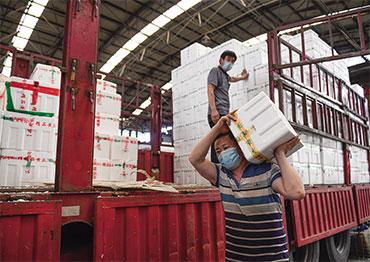hina’s State Council issued a guideline on accelerating the establishment of a nationwide unified market on April 10, proposing to unify market rules throughout the country and break monopolies and local protectionism.
The move is intended to facilitate the smooth flow of commodities across the country.
The Chinese market has long-been encumbered by fragmentation, localism, insufficient circulation, opaque supervision and improper intervention by local governments, analysts said. A unified national market aims to remove barriers by implementing standardized rules, sharing high-standard facilities, balancing resources and instituting fair and unified market supervision.
Guo Liyan, director of the Comprehensive Situation Study Office of the Chinese Academy of Macroeconomic Research told State-run China Central Television (CCTV) that the country aims to build a “powerful” market which is not only big in scale and range, but more importantly of a better structure with improved systems. “Such a powerful market is more influential and attractive to the world,” she said.
The guideline stresses marketization and the rule of law. It is expected to play a decisive role in resource distribution by transforming government functions. It will guide and optimize supply based on demand, and enable supply to better serve and expand demand.
Institutional barriers that have obstructed factors of production from flowing based on market demands must be broken, and the institutional cost of circulation should be reduced.
Breaking local protectionism is another focus. The document proposes a nationwide unified market entry list and a national system for enterprise registration. It forbids local governments from locking out other regions in the name of internal circulation and requires them to remove all measures that discriminate against foreign or non-local enterprises.
Analysts believe the guideline is a response to China’s economic slowdown amid new rounds of the Omicron-fueled pandemic, which has impacted the whole country’s economy and supply chains.
On April 7, Chinese Premier Li Keqiang held a meeting with economists and leading entrepreneurs, including those from China Logistics Group and China Capital Goods Group for Agricultural Production. He reiterated the importance of a stable economy and guaranteed grain production, energy supply and smooth logistics.
On April 11, the State Council’s Covid-19 pandemic control and prevention center issued a document banning local departments from arbitrarily blocking or closing highways, roads and waterways under their incrementally intensified pandemic control. The document is seen as a positive signal to promote the guideline.
“A unified national market is key to solidifying smooth circulation in the domestic economy and it is helpful to stimulate and cultivate domestic market potential. It will be strong support so we can respond to outside uncertainties with domestic certainties,” Guo said.

 Old Version
Old Version